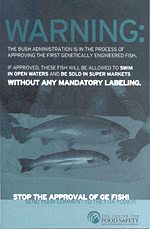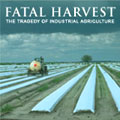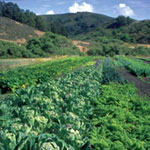Kiki Hubbard is an intern at the Center for Food Safety, a nonprofit organization that addresses the impacts of our current industrial food-production system on human health, animal welfare, and the environment.

Wednesday, 22 Jan 2003
WASHINGTON, D.C.
I begin the day by getting lost in Arches National Monument. As I end a chapter in Desert Solitaire, my train comes to a halt at the Eastern Market Metro stop, where I proceed to take on my daily challenge of weaning myself off coffee. Most days I win this battle, but reading about the desert made me crave warmth — and for once there is money in my wallet.
The phone begins to ring at precisely the moment I step into the comfortable, informal office of the Center for Food Safety. The man on the phone is inquiring about our genetically engineered (GE) fish campaign, and I put some materials together for him before heading to the post office. Many of our phone calls come from understandably angry individuals who have just learned about food-safety issues affecting both human health and the environment. It is exciting to hear the urgency in many of these voices, and to share with them information about how they can play an active role in ensuring that federal agencies make ethical decisions about our national food supply.
In May 2001, CFS filed a petition with the U.S. FDA and four other agencies in response to an application currently being reviewed by the FDA to approve the first GE fish, a salmon that will grow faster than its natural cousins. If the application is approved, these GE salmon may be grown in open waters and sold commercially. Our concerns is that the FDA will approve the application without sufficiently analyzing the human health concerns, including the potential impacts of significantly elevated growth-hormone levels in the fish. The FDA would also allow GE fish to be marketed despite recent studies showing that they could decimate native salmon populations.

The GE fish postcard.
This morning’s caller requested a large quantity of our GE fish postcards, which are addressed to the FDA and express support for a moratorium on the approval of GE salmon. It is encouraging to correspond with people who understand the imperative nature of our efforts, and even more encouraging when they want to serve as local leaders for our campaigns. Each day I am reminded of how much our influence depends on one particular tool: education.
After returning from the post office, where I mailed dozens of letters and publications to members, I left the office with CFS’s other intern, Hilary, who has given me the privilege of knowing that I began a shared internship with a stranger, but will conclude it with a close friend. We spend the rest of the afternoon representing CFS at American University’s “Externship Fair.” We accepted resumes for law clerk positions, which involve conducting legal research, writing legal memorandum, and attending hearings, agency meetings, and press conferences. University fairs offer valuable opportunities to distribute materials about our campaigns and expose prospective interns and clerks to the issues that CFS addresses. Several people impressed Hilary and me, and I hope that the conversations we had with them will help garner the interest of these intelligent and highly motivated individuals for legal work on behalf of the environment.
After the fair, we join the other recruiting organizations for drinks and food, compliments of American University. As we put on our coats and finish our beers, we classify our afternoon as one of the perks of our job. And while not every day leaves me with something to toast, I always seem to find a reason to smile.
Thursday, 23 Jan 2003
WASHINGTON, D.C.
Mental note: Buy a cup of coffee for the kind souls who stand at the top of Metro escalators in the freezing cold handing out “Save our Forests” postcards.
As I enter the office, I glance to my left at a stack of newspapers that have accumulated over the past two weeks with articles relating to the Center for Food Safety’s work waiting to be cut out — all in good time. After checking my email and making a cup of tea, I continue some research on food-irradiation issues that I began last week for our policy analyst. The USDA is poised to permit irradiated food to be served in the National School Lunch Program, even though the technology has not been proven safe and merely serves as a “quick fix” for filthy and inhumane meat-processing practices. School lunches already share some responsibility for child obesity, and it enrages me that children would be exposed to further trouble from cafeteria food; the research shows a wide range of health problems in laboratory animals that have eaten irradiated foods. CFS is collaborating on this issue with Public Citizen, a nonprofit working to protect health, safety, and democracy — which reminds me of the next task on my to-do list.
Taking a break from my research, I sit down with my lunch armed with an extensive list of co-ops around the country. I call several of them to ask if they would be willing to receive a bulk mailing of postcards for their customers. These postcards are addressed to the USDA and ask the agency not to allow irradiated food to be served in the National School Lunch Program. Co-ops are wonderful sources for material distribution, and CFS works closely with many to get our publications in the hands of consumers. One success story involves our GE fish campaign, 175,000 of the postcards we produced as part of this campaign have been distributed in 48 states. Since the filing of our legal petitions in May 2001, the FDA has received over 50,000 comments in support of our demands. Of these comments, the majority have resulted from postcards sent to co-ops; the remainder were sent by email.
I write three letters as follow-ups to phone conversations, which will be sent out along with our popular publications “Food Safety Now!” and “Food Safety Review.” Hopefully, the letters will lead to new memberships to assist our efforts; CFS proudly corresponds with 3,000 members. Before leaving for the day, I type out my findings for our policy analyst, record new memberships into the database, and check my email one last time.
Leaving the office, I reflect on the many other activities taking place in the buildings around me. In a country of over 260 million people, it’s hard to believe I make a difference at all. But every footstep leads somewhere and every footstep leaves something behind. The biggest challenge we face is creating a new norm. Normal in our culture consists of not producing one’s own food, or even understanding where it comes from. Normal is bottled water and genetically engineered food. But normal is only that which is defined by society, and we can define a new normal by returning to a more sustainable lifestyle, reconnecting with the natural order, and recognizing the intrinsic value of all life forms.
Friday, 24 Jan 2003
WASHINGTON, D.C.
Friday always comes as fast as the weekend goes. Although most other days offer a variety of new assignments, the end of the week generally involves the same task: taking inventory of new memberships and renewals from over the course of the week. Hilary and I write letters and make sure they are sent with the appropriate publications before visiting the nicest, and I mean nicest, postal workers a few doors down on Pennsylvania Avenue. (I keep meaning to bake them cookies).

Generous contributors receive CFS’s most recent publication, Fatal Harvest: The Tragedy of Industrial Agriculture, which helped launch an Organic & Beyond campaign this past summer. Through the campaign, a coalition of 14 groups are seeking to create a new agrarian consciousness, and the book is a beautiful tool for achieving that goal. This collection of essays and photographs serves as a plea for a return to a more local, family-scale, biologically diverse, socially just, and humane agricultural system. Many of the authors expose the way agribusiness has erased the essence of agriculture — culture — and illustrate through example how decisions involving where our food comes from will shape the future of our environment.
In addition to working on creating a new agricultural system, CFS is addressing the impacts of the current one, especially through legal work. Recently, the group took to the courts in response to a disclosure of bio-contamination in Iowa and Nebraska by corn and soy plants genetically engineered with an unknown pharmaceutical or industrial chemical. The legal action asks the Bush administration to halt the planting of such “biopharm” crops and to prepare an Environmental Impact Statement for the contaminated farms.

A better way to grow: Organic brussels sprouts.
CFS has also joined its sister organization, the International Center for Technology Assessment, in a lawsuit against the USDA to halt the commercialization of genetically engineered lawn grass. The USDA is ignoring serious environmental risks, for not only are the creeping bentgrass and Kentucky bluegrass widely recognized as noxious weeds that threaten parks and wilderness areas, but the grasses are genetically engineered to resist the top-selling herbicide Roundup. If commercialized, home lawns, schools, sports fields, and golf courses will be able to survive being sprayed with massive amounts of herbicide, which could pose serious health risks for both the environment and people.
I came to Washington, D.C., to feed my curiosity about the legal aspect of environmentalism, leaving behind a job at Wisconsin’s only designated wilderness state park. (I never knew you could get paid to hike.) Needless to say, it’s been a tough transition. The concrete jungle has me feeling suffocated and nostalgic for black-throated green warblers and Lake Michigan shoreline. But the difficulties of adjusting to an urban life are outweighed by the importance of meeting the minds behind the legal petitions fighting the harmful technologies that so often slip into our lives without our knowledge. The promises held out by these technologies are often false ones, and as consumers, we are made to be guinea pigs in the name of industrial profit.
As I read the last pages of Desert Solitaire this morning on my way to work, I made my peace with whatever doubt still lingered inside me as a result of the recent transition in my life. When I read this Edward Abbey classic for the first time two years ago, it was his untamable “wildness” that enlivened me most. But today what comforts me is to know that even he had the need for the company of chaos:
Balance, that’s the secret. Moderate extremism. The best of both worlds. Unlike Thoreau who insisted on one world at a time I am making the best of two. … I grow weary of nobody’s company but my own — let me hear the wit and wisdom of the subway crowds again, the cabdriver’s shrewd aphorisms, the genial chuckle of a Jersey City cop, the happy laughter of Greater New York’s one million illegitimate children.
And so I thank his legacy of words. It reaffirms why I’m here: to bear witness to and take part in the preservation of a different legacy — the land.

